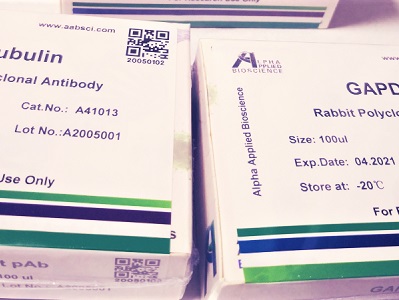

MKKS rabbit pAb
Cat :A17628
-
Source
Rabbit
-
Applications
WB
-
Reactivity
Human, Mouse
-
Dilution
WB 1:500-2000
-
Storage
-20°C/1 year
-
Specificity
This antibody detects endogenous levels of MKKS at Human/Mouse
-
Source/Purification
The antibody was affinity-purified from rabbit serum by affinity-chromatography using specific immunogen.
-
Immunogen
Synthesized peptide derived from human MKKS
-
Uniprot No
Q9NPJ1
-
Alternative names
McKusick-Kaufman/Bardet-Biedl syndromes putative chaperonin (Bardet-Biedl syndrome 6 protein)
-
Form
Liquid in PBS containing 50% glycerol, 0.5% BSA and 0.184% sodium azide.
-
Clonality
Polyclonal
-
Isotype
IgG
-
Background
This gene encodes a protein which shares sequence similarity with other members of the type II chaperonin family. The encoded protein is a centrosome-shuttling protein and plays an important role in cytokinesis. This protein also interacts with other type II chaperonin members to form a complex known as the BBSome, which involves ciliary membrane biogenesis. This protein is encoded by a downstream open reading frame (dORF). Several upstream open reading frames (uORFs) have been identified, which repress the translation of the dORF, and two of which can encode small mitochondrial membrane proteins. Mutations in this gene have been observed in patients with Bardet-Biedl syndrome type 6, also known as McKusick-Kaufman syndrome. Alternative splicing results in multiple transcript variants. [provided by RefSeq, Nov 2013],
-
Other
MKKS BBS6, MKKS
-
Concentration
1 mg/ml
| Product | Reactivity | Applications | Conjugation | Catalog | Images |
|---|
-
 400-836-3211
400-836-3211
-
 support@aabsci.com
support@aabsci.com
-
β-actin rabbit pAb ...... >
-
β-actin rabbit pAb(A284) ...... >
-
Plant-actin rabbit pAb ...... >
-
β-tubulin mouse mAb(M7) ...... >
-
GAPDH mouse mAb(2B8) ...... >
-
GAPDH mouse mAb(PT0325) ...... >
-
Histone H3 rabbit pAb ...... >
-
Histone H3 rabbit pAb ...... >
-
COX IV mouse mAb(6C8) ...... >
-
GFP-Tag mouse mAb(1G6) ...... >
-
HA-Tag mouse mAb(1B10) ...... >
-
mCherry-Tag mouse mAb(6B3) ...... >










 400-836-3211
400-836-3211
